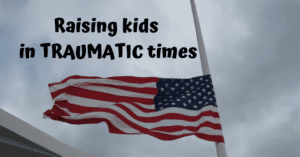 We weren’t even out of the airport, having just spent an amazing week in Mexico with family and friends. My mind was focused on retrieving our luggage, catching our shuttle and navigating Chicago traffic. The current events of the day were not remotely on my radar screen.
We weren’t even out of the airport, having just spent an amazing week in Mexico with family and friends. My mind was focused on retrieving our luggage, catching our shuttle and navigating Chicago traffic. The current events of the day were not remotely on my radar screen.
Then I heard my teen daughter say, “Ugh. Who got shot this time?”
It wasn’t a newspaper headline that caught her eye. It was the American flag at half-staff. My husband and I had heard at the resort that former President George H.W. Bush had passed. It hadn’t occurred to me to tell the kids.
How did we come to live in a world where children see a lowered flag and automatically assume there’s been another mass shooting? And how in the world do we parent these children?
Our drive home was relatively quiet and gave me time for reflection. The only answer I can come up with? I don’t have the answer.
I remember where I was when I heard about the shooting at Columbine High School. It was in April of 1999, and I was a senior at UW-Oshkosh. Can I recall where I was or what I was doing when I heard about any of the other school shootings since then? Only vaguely … and I guarantee my children cannot. There’ve just been too many.
We grew up in an era where boys picked on girls in the lunch line, and girls gossiped and passed mean notes about each other in middle school. We practiced fire drills in the fall and tornado drills in the spring. If you wanted to call home after sports practice, there was a pay phone in the cafeteria that cost 25 cents. Let it ring once – that was the code.
Today’s kids have smart phones all but surgically attached to their hands. When my daughter needs a ride home, we typically exchange five to 10 text messages – no joke. Bullying today is also taken to a whole new level. Insults and mean jokes go viral on Snapchat and Instagram in less time than it took us to fold a paper note.
And then there’s the drills. Not just for fires or tornadoes, but for active shooters. Kindergartners are being taught what to do if an armed intruder comes into their classroom. I can’t even wrap my head around it.
So if we, as parents, can’t relate to what our kids are going through in this new era, how do we help them cope?
We start, I think, by having an awareness of the situation and a handle on our own feelings. I missed an opportunity to share with my girls that the flags were down at the airport because a former president of the United States passed away – a statesman, father and grandfather who devoted his life to public office and humanitarian activism. I missed a chance for us to pray for the family he left behind.
We can also follow the example of the late Mr. Fred Rogers, who encouraged us to “look for the helpers.” Talk about the rescue workers and the heroes. Allow your kids to come to you and talk about their feelings. Keep the lines of communication open.
Today, perhaps more than ever before, I feel it is vitally important to help our kids grow emotionally as well as physically. A daunting task, for sure, and I’m certainly not an expert. When all else fails? Drop whatever else you might be doing and wrap your kid up in a big hug. That’s one parenting move that will stand the test of time.
What’s your best tip for helping children cope with difficult events? Please share in the comments.

















